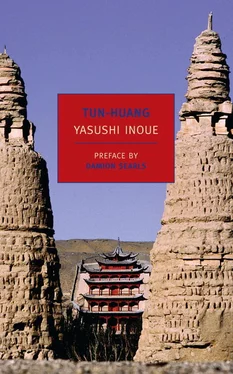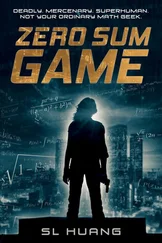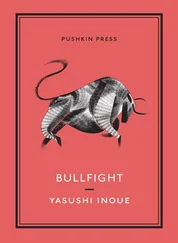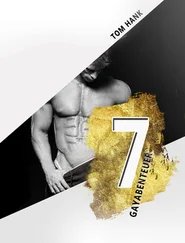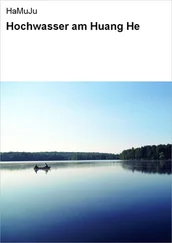By the time Hsing-te had returned to the square, the caravan of heavily loaded camels was about to leave by the East Gate — the same gate through which Wang-li’s troops had departed that morning. The major portion of the goods had been loaded; only a small number of boxes were left.
Kuang rode the fifth camel from the lead, and Hsing-te led his camel into the line right behind Kuang. The three young monks were assigned positions in the rear. As a leader, Kuang appeared to Hsing-te much more impressive than usual. He had loaded on his sixty camels the accumulated wealth of many generations of the Ts’ao dynasty, which had long held sway in the western regions. At least, Kuang thought so. That belief gave him an expression of such arrogance that it was almost pitiful. At no other time had Kuang appeared so strongly a descendant of the Wei-ch’ih royal house as now.
As soon as they had passed through the city gate, the moon suddenly became brighter, and the cold night air cut through them. The caravan headed eastward, bathed in the moonlight.
After passing over three miles of fields, the caravan reached the banks of the Tang River. The river was frozen, and the withered reeds that grew all over the area looked as if they had pierced the ice. The group crossed the river and continued eastward along a canal for some time. The road curved toward the south; the fields ended around here and the men entered the desert. On the sandy plains, the shadows cast by the caravan suddenly became darker. Neither Kuang nor Hsing-te uttered a word. Hsing-te once turned to look back.
The caravan, each camel loaded with large and small boxes divided equally on either side, proceeded silently in single file beneath the moon. When Hsing-te reflected on the fact that the boxes contained sacred scrolls and documents, the camel caravan behind him suddenly seemed rather strange. There was something moving about the sight of sixty large beasts, each loaded down with scrolls and documents, advancing across the moon-bathed desert, but Hsing-te could not define why it was so. He wondered whether it might be that he had been wandering around the frontier regions for years just for this night.
The caravan finally reached the banks of a tributary of the Tang River. This was also completely frozen over, but they did not cross, and traveled along its banks. The road would take them directly to the Thousand Buddha Caves.
They followed the river for seven miles. The bitterly cold wind increased in ferocity, and now and then dust clouds flew up from the camel’s feet. In the darkness, the men could not see the dust, but they could feel the sand particles as they hit their faces. With each gust of wind, the camels turned to one side, and thus progress was very slow.
The caravan finally reached the foot of the Ming-sha mountains, where the Thousand Buddha Caves were located. By that time, Hsing-te was thoroughly chilled and numb all over.
“We’ve arrived!” As soon as Kuang brought his camel to a halt, he jumped to the ground. In heavy fur clothing, he lifted his hand to his mouth and whistled, whereupon all the men alighted from their camels.
Hsing-te looked toward the hill, which rose high in front of him, its slopes running from north to south. In the hill, he could see numerous large and small square-shaped grottoes. Some were clustered in groups, while others were single caves twice the height of the others. The surface of the hill appeared bluish black in the moonlight; only the caves themselves were as dark as eye sockets.
Without resting, the camel men immediately set to work unloading the goods. Kuang called out to Hsing-te, “Follow me.” Kuang left the group and began to walk off alone. The Thousand Buddha Caves were directly in front of the two men. They had only to walk up an incline of approximately twelve feet, but the climb was not easy as the sand gave way beneath them. They scaled the slope and arrived in front of a cave.
“The largest hole is in this cave. It’s to the right of the entrance, so it’s easy to locate. If it’s not enough, I’ve located three or four other holes nearby.” Kuang began to walk again, but stopped and said, “You won’t have any need for the other holes right now. Now listen, I’ll leave about ten men with you, so have them and the monks help carry in the goods. I have to leave.”
Kuang started down the hill. Hsing-te decided to look over the secret hiding-place later and returned with Kuang to the camels. The unloading had already been completed. The camel men had piled the crates in one place.
After Kuang had selected the ten men to remain behind and ordered them to follow Hsing-te’s instructions, he told the other camel drivers to start to leave and mounted his camel. Kuang was about to take all the camels with him, but Hsing-te requested that he leave at least four or five. Kuang would not consent, but grudgingly agreed to spare him one.
At the head of his caravan, Kuang left the Thousand Buddha Caves, leaving Hsing-te, the three monks, and the ten camel men.
After the caravan had gone around the foot of the hill and disappeared from sight, Hsing-te left the men, who had started to build a bonfire, and went up to the cave with the secret hiding-place. He noted that this particular cave toward the north grotto area was the lowest level of a three-storied grotto, and one of the largest among the innumerable stone caves.
Hsing-te was the first to enter the cave. Within, he discovered frescoes of numerous bodhisattvas on the left-hand wall. In the moonlight, which hit the base of the frescoes through the entrance, they appeared to be entirely blue. Most likely, they were painted in various colors, although the paint may have faded. The opposite wall was in darkness and its frescoes were indistinct. Hsing-te had entered cautiously, but it was so dark that he could not see anything, so he gave up. It was apparent that the interior was larger than the entrance. Just then, one of the monks standing behind Hsing-te said, “Here’s a hole.” It was located on the north wall. When the men approached it, they found that there was, indeed, an opening two feet wide by five feet high, big enough for a man to crawl through. It was too dark, however, to see inside.
Hsing-te had somehow thought they could hide the goods during the night. Had they been able to see the interior clearly only once, the task might have been possible, but as it was, the obstacles seemed too great for the four men who stood in front of the cave.
“As things are, we can’t do anything,” said Hsing-te.
“All right, I’ll go in,” the youngest monk volunteered. He crouched over, stuck his head in the cave and looked about and then slowly entered the darkness. For a time there was silence. Finally, he emerged and said, “It’s not damp inside. It will probably be safe to store the sacred scrolls in there. It’s rather spacious inside, but I have no idea of the shape of the room.”
“One of the camel drivers may have a light. Go and ask!”
Another of the monks immediately left the cave. He soon returned with two camel men. One entered the cave with a candle made of sheep’s oil in a pot, and two monks followed him in. The cave was approximately ten feet square, and all four walls had been plastered. It was apparent from the fact that there were frescoes on the north wall, that this was a partially completed side cave. When the light was brought up to the wall, the men saw figures of nuns and attendants standing face to face amidst a grove of trees with several branches hanging down. On the branches were hung water jars and bags which appeared to belong to the people assembled there. The nuns held large fans, while the attendants carried long staffs.
This was indeed an appropriate hiding place, Hsing-te thought. It was probable that the Buddhist scrolls and other documents they had brought would fit in, and as the entrance was small, it would be a simple matter to seal it.
Читать дальше
